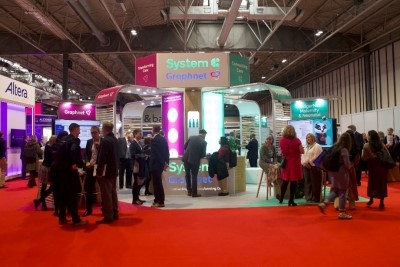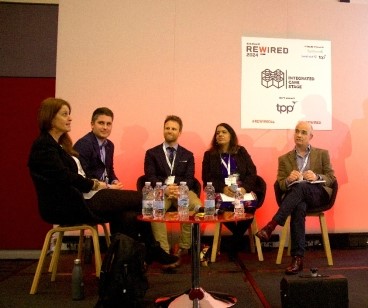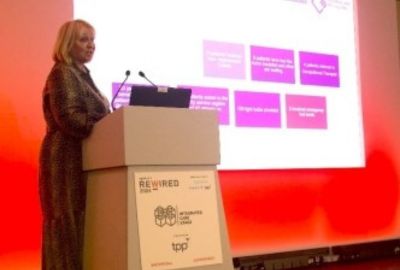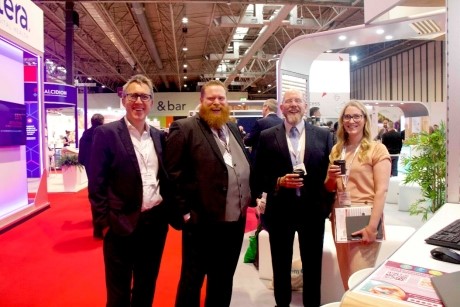Rewired 2024 – excitement, innovation, and emotion.
15 March 2024

Graphnet Health was proud to once again be a headline sponsor at Digital Health Rewired. Taking place from 12-13 March this year, tens of thousands of digital leaders from across the health and care industry joined us at the impressive NEC in Birmingham to hear about the latest developments and innovations.
Eleven of our customers had speaking slots this year, along with our executive director Markus Bolton. We were incredibly proud of these presenters as they shared just how impactful their population health led programmes have been, as well as their plans for the future.
The audiences were some of the most engaged we’ve ever seen, and one of our speakers, Dianne Green from the Cheshire and Merseyside ICS, even brought a few of them (including the Chair) to tears. You can read more about that further down in this report.
“We need population health to develop the right approaches” Markus Bolton kicks off Rewired.
Markus kicked off the event by taking part in a keynote panel discussion on the Digital Transformation stage, which examined, ‘A systems view on money, digital, the NHS and UK economy.’ He talked about population health and how it provides both the “insights and actions needed to make transformation possible.”
He demonstrated the power of a population health led approach by referencing how the Frimley ICS has used data to find and support 30,000 people suitable for remote monitoring.
Another of the points that Markus made was around the downsides of lobbying, which drew applause from the room, which was packed to the rafters.
“If you want to get more productivity, get rid of lobbying!” said Markus.
This session was covered by Digital Health.
Catherine McClennan shares an innovative approach to tackling health inequalities.
Later that day, Catherine McClennan, Cheshire and Merseyside Women’s Health and Maternity ICB, took to the Integrated Care stage to talk about models of care and tackling health inequalities.
Catherine discussed the region’s vision for improving women’s health and wellbeing, and how they are transforming care through their population health dashboard and data driven pregnancy register.
“Pregnancy is one period in a person’s life where healthcare inequalities are emphasized. While it was incredibly challenging, the pandemic did enable us to find solutions quite quickly in terms of how we address some of those health inequalities,” explained Catherine.
She added that the data is now enabling Cheshire and Merseyside to identify other health factors and work that needs to be done. This includes identifying areas with increased rates of teenage pregnancies, allowing them to offer targeted support. It is also being used to inform targeted smoking cessation services.
Virtual wards - best practice
Meanwhile, on the Smart Health stage, Dr Paul Hudson, operational medical director at Dudley Group NHS FT, was speaking to a captivated audience about the Trust’s virtual wards, including its pioneering paediatric virtual ward, which uses the Docobo technology.
Paul cited a local mum who had praised the virtual ward for keeping her son out of hospital, with twice daily calls from NHS staff. She said: “Now my son is on the virtual ward I can record his observations as many times as I want throughout the day, recording them onto the virtual ward pad and a member of staff calls me twice daily which reassures me that he is safe in our home environment. The new virtual ward is great for me and my family as it stops my son staying in hospital longer than he needs.”
“If you bring it back to the patient, the improvement in quality of life from virtual wards has made a massive difference,” Paul said.

Population health insights into action
Our last session on day one was made up of what could be described as a population health ‘dream team.’ The following came together to discuss population health in action.
- James Palmer, programme lead, Population Health Management, NHS Surrey Heartlands ICS
- Peter Almond, telehealth head of service, Mersey Care NHS FT
- Dr Rosie Kaur, CCIO and deputy chief medical director, Mersey Care NHS FT
- Sharon Boundy, director of transformation and digital, NHS Frimley ICB
- Charles Elliott, population health clinical lead, NHS Frimley ICB
James Palmer started by explaining how data and analytics is making a huge contribution to planning proactive care services across the Surrey Heartlands ICS. “It’s about operational transformation with digital enablement,” he said.
Sharon Boundy said, “We need to move from reactive to proactive care and population health insights are key.” She then went on to demonstrate how population health data is being used to target those suitable for remote monitoring, with all data flowing back into the shared care record.
Charles Elliott then shared some inspirational results from the Frimley remote monitoring programe, which led to a 38.6% reduction in A&E admissions amongst other benefits.
“The only way it can work effectively is when everyone in the system is using the same remote monitoring model,” he emphasised.

Fuel poverty stories bring the audience to tears.
Last, but by no means least was another session focused on population health and fuel poverty in action on the second day. The panel included:
- Dr Caroline Pritchard, consultant anesthetist and perioperative service clinical lead, Buckinghamshire Healthcare NHS FT
- Prof Rowan Pritchard Jones, executive medical director, Cheshire and Merseyside ICS
- Diane Green, community nurse, Cheshire and Merseyside ICS
Caroline provided a very interesting account of how Buckinghamshire has connected patient treatment lists to its shared care record – to remap perioperative pathways and boost patient recovery. She explained that the incorporation of primary care data is allowing clinicians to identify patients on waiting lists with chronic conditions and co-morbidities. Along with many other benefits, this is leading to significant time savings and also helping fill cancelled slots.
Professor Rowan Pritchard-Jones (who spoke superbly – particularly for someone who had been in the operating theatre until late the previous night), introduced the audience to the Cheshire and Merseyside fuel poverty programme.
“This is where data is turned into action,” he said. “It’s about the individual stories, which is the bit that really drives us on – making a huge difference to those people, their families and NHS resource as well.”
Dianne then discussed the astonishing outcomes that she has seen from the ‘Warm Homes for Lungs’ project, which is part of Cheshire and Merseyside’s fuel poverty programme. Her account of how her team has been able to use population health and data-led insights to support patients in need brought many of the audience to tears, including the Chair, John Mitchell, from the NHS Humber and North Yorkshire Integrated Care Board.
“I had one patient who said that he had to choose between 24-hour oxygen or turning his heating on,” she said, emotionally. “Now, because of this programme, he doesn’t have to make that decision anymore.”
Thank you

An enormous thank you to our customers – whether you were sharing your stories on stage or the exhibition floor; to our business partners; our employees (whether you were at Rewired or holding the fort ‘at home’) and to Digital Health.
We’re already looking forward to Rewired 2025. Keep an eye on our website and social media channels for further details on this and other events we have planned over the coming months.









